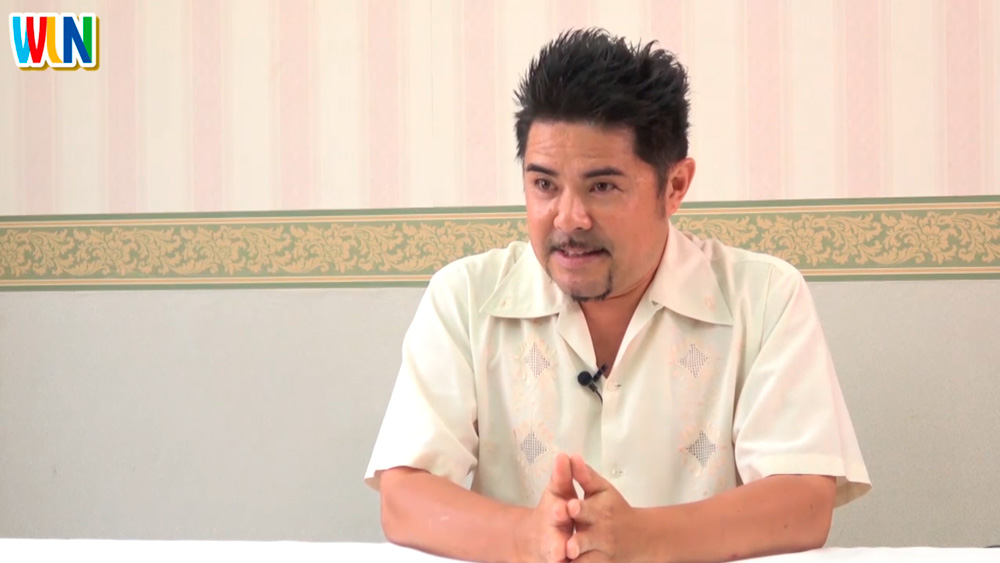Let’s get together and mingle, everyone!
2017年8月29日
ALBERTO SHIROMA(アルベルト城間)

What made you come to Okinawa?
I got a plane ticket to Japan in 1985 as the winning prize for a singing contest. I went to Tokyo to pursue my dream of becoming an enka singer, but that dream didn't come true. I visited Okinawa after two years.
At that time, I didn't have any concrete plans of what to do in Okinawa. All I knew was that I wanted to learn more about Okinawa, where my ancestors came from. What made my really happy was that people said, "welcome back" to me, even though it was my first time coming to Okinawa. It made me so happy that I realized that this was my home, that Uchinanchu (Okinawans) were going to accept me.
I am appreciative of the fact that my grandparents immigrated to South America. They became the bridge between Okinawa and Peru.
How much did you know about Okinawa before coming here?
I had barely heard about Okinawa.
My grandparents' Spanish wasn't very good, and I didn't understand Japanese. We couldn't communicate very well.
I had seen pictures of my grandparents taken in Okinawa, but what was in the background was just sugarcane fields. So I simply thought that Okinawa only had sugarcane fields.
What were some of your challenges living in Okinawa?
I barely used Japanese while I was in Peru, so language was a big challenge.
But I think I was able to improve because I loved Japanese music.
It definitely was a challenge, but I think I was able to learn the language quick because I enjoyed it--due in large part to Uchinanchu's generosity everyday.
What is your definition of Uchinanchu?
What is Uchinanchu? The literal definition, of course, is Okinawans. But what characterizes them is their curiosity. They are always interested in new things. And filled with curiosity.
This has been the driving force for the development of their culture. Okinawans have been adopting many things over the course of their history, and this constitutes the eclectic culture in Okinawa today.
Uchinanchu are always growing as people. And that makes them attractive.
I would love for them to keep on growing, keep on adopting new things.
When did you feel your Okinawan identity?
I had heard the sound of sanshin (Okinawan instrument) growing up, so that wasn't new.
But when I first held a sanshin after coming to Okinawa, I felt this sense of nostalgia.
As for kachashi (festive folk dance), I had never danced it in Peru, but I could dance it no problem in Okinawa. I had seen my grandma dance kachashi, so I had it in my memory--the moves, the atmosphere, and the facial expressions.
The fact that I could dance it helped me have more confidence, too.
It's difficult to put it into words, but I felt like I had always had Okinawan identity, without me realizing it.
Is Okinawan identity reflected in your music?
Yes, of course. The kind of music I'm aiming for is shimauta (Okinawan folk music). I would be overjoyed if one day Uchinanchu categorized our music as shimauta.
As Diamantes we don't use sanshin, but the music is created in Okinawa, so I perceive our music as shimauta.
Our music could naturally become shimauta if Uchinanchu sang our songs and danced to them in their daily lives.
Any thoughts on the Worldwide Uchinanchu Day?
The day was probably set so that we won't forget about Worldwide Uchinanchu Festival.
When we talk about "worldwide Uchinanchu," I don't think we're only talking about Uchinanchu that live abroad.
We're also talking about Uchinanchu that live in Okinawa.
In my opinion, all the people that are involved in Worldwide Uchinanchu Festival are Uchinanchu. Same with Worldwide Uchinanchu Day.
I'd say we can think of Worldwide Uchinanchu Day as the day to celebrate inhabitants of the Earth.
Any messages to Uchinanchu of the next generation and to Uchinanchu abroad?
Let's get together and mingle, everyone!
I think it's best if we could spread Okinawa's message by mingling. And never stopping.
Get involved. Mingle. If we keep on doing this vis-a-vis the world, then we should be able to conserve the most important part of Okinawa. And we should be able to communicate our thoughts.
Being passive can only take us so far. So I want us to be more active. I want us to be like Uchinanchu from the past, who dreamed big and took off to other parts of the world.
It's my hope that Uchinanchu of the next generation be like that.
And to the Uchinanchu abroad, please strive where you are, learn many things, and promote Okinawa.
And next time we gather at Worldwide Uchinanchu Festival, I would love for them to come back proud and show us what they learned in their respective countries.






